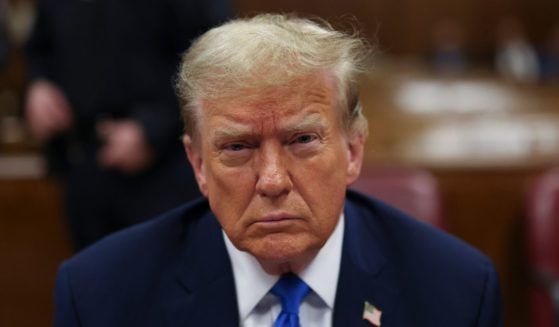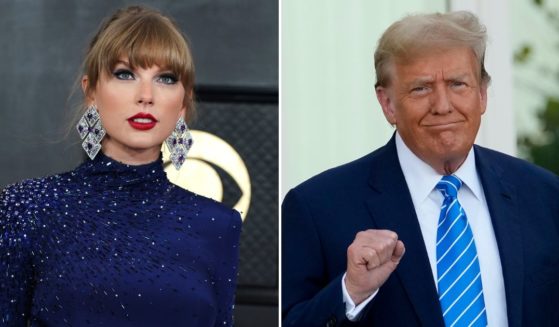Here's Why Trump's Tweet About Chinese Jobs Was Actually a Brilliant Move
During the campaign and the first 16 months of his presidency, President Donald Trump has made a reputation of being tough on the Chinese. He’s imposed sanctions, given the go-ahead to plenty of freedom of navigation operations in the South China Sea and implored Beijing to put pressure on the North Koreans to come to the table.
So, given all that, it was quite a surprise when Trump personally asked Congress to remove ZTE — a Chinese cell phone maker that recently shuttered its doors because to sanctions imposed due to intellectual property theft — from the sanctions list in order to get them back into business.
“President Xi of China, and I, are working together to give massive Chinese phone company, ZTE, a way to get back into business, fast. Too many jobs in China lost. Commerce Department has been instructed to get it done!” Trump tweeted on Sunday.
President Xi of China, and I, are working together to give massive Chinese phone company, ZTE, a way to get back into business, fast. Too many jobs in China lost. Commerce Department has been instructed to get it done!
— Donald J. Trump (@realDonaldTrump) May 13, 2018
China and the United States are working well together on trade, but past negotiations have been so one sided in favor of China, for so many years, that it is hard for them to make a deal that benefits both countries. But be cool, it will all work out!
— Donald J. Trump (@realDonaldTrump) May 13, 2018
Trump’s support for ZTE flew in the face of Republicans on Capitol Hill, who were hoping for more regulation on Chinese telecommunications companies, not less.
Problem with ZTE isn’t jobs & trade, it’s national security & espionage. Any telecomm firm in #China can be forced to act as tool of Chinese espionage without any court order or any other review process. We are crazy to allow them to operate in U.S. without tighter restrictions https://t.co/AXtTDgufc9
— Marco Rubio (@marcorubio) May 14, 2018
“Problem with ZTE isn’t jobs & trade, it’s national security & espionage. Any telecomm firm in China can be forced to act as tool of Chinese espionage without any court order or any other review process. We are crazy to allow them to operate in U.S. without tighter restrictions,” GOP Florida Sen. Marco Rubio tweeted on Monday.
Senate Minority Leader Chuck Schumer of New York was equally critical of the Trump administration’s plans for ZTE.
“One of the few areas where the president and I agreed, and I was vocally supportive, was his approach towards China,” Schumer said, according to The Hill. “But even here he is backing off, and his policy is now designed to achieve one goal: make China great again.”
“That’s the most insane political thing I have ever seen,” Derek Scissors, resident scholar with the American Enterprise Institute, said about Trump’s statement regarding jobs lost at ZTE. “That’s opening the door to saying we will not enforce American law to any Chinese firm that matters.”
On paper (or, well, Twitter), this move didn’t look terribly good for the Trump administration. ZTE was facing penalties from the FCC for a panoply of reasons. Much like fellow cell phone Huawei, ZTE was being punished for violating sanctions against exporting technology to Iran and North Korea. It also has close ties to the Chinese government, something that raises significant security concerns given the fact that they use high-tech U.S. components and have access to our telecom system.
According to The New York Times, the sanctions would bar U.S. telecom companies from using products from suppliers that are “deemed to pose a risk to American national security” — namely Huawei and ZTE. They would also be barred from using components sourced from the United States.
This left ZTE on the verge of collapse — and meant Trump stepping in might not have been as unwise as the media or Congress might think.
First, as Trump himself pointed out on his Twitter account, the United States has a lot to lose if things go south with China. Yes, obviously China needs to face some retribution for its laissez-faire policies on intellectual property theft and its history of trade manipulation, but putting ZTE into bankruptcy likely isn’t going to help either China or the United States.
Then there’s the issue of free trade. Remember that? Of all of the concerns conservatives have had about the Trump administration (this conservative, anyhow), his relative disinterest in open markets has been one of the most distressing. Yet, in his tweets about ZTE, Trump sounded positively Friedman-esque. (Well, as Friedman-esque as you can sound in 280 characters.)
ZTE, the large Chinese phone company, buys a big percentage of individual parts from U.S. companies. This is also reflective of the larger trade deal we are negotiating with China and my personal relationship with President Xi.
— Donald J. Trump (@realDonaldTrump) May 14, 2018
Trump also said that ZTE’s survival could be part of a larger trade deal that Trump’s administration is trying to make with China.
“Nothing has happened with ZTE except as it pertains to the larger trade deal,” the president tweeted Thursday,
The Washington Post and CNN have typically written false stories about our trade negotiations with China. Nothing has happened with ZTE except as it pertains to the larger trade deal. Our country has been losing hundreds of billions of dollars a year with China…
— Donald J. Trump (@realDonaldTrump) May 16, 2018
What remained unmentioned is that ZTE wouldn’t be the only one who would be losing out if the sanctions were imposed. As The New York Times reports, Apple does $46.5 billion in business in China. You don’t think that they’re going to face the same fate in China that ZTE has in America — particularly given the capriciousness of the Xi regime?
And then there’s another reason the media isn’t considering: the fact that this move could be a thank-you of sorts for China’s help on the North Korea issue.
While China’s relationship to the United States when it comes to Pyongyang has been a difficult one. Just Thursday, Trump accused President Xi of influencing Kim Jong Un to protest previously-scheduled military exercises involving the South Koreans and United States, a move which extended to Pyongyang scuttling a meeting with the South Koreans. There’s no question that the scheduled June summit between Trump and Kim wouldn’t be happening if the Chinese weren’t exerting some level of pressure on the Juche regime.
While technology theft and security concerns regarding the Chinese are both major issues, they can be dealt with in time. North Korea can’t; A nation that’s fond of testing nuclear weapons and has made monumental strides in ballistic missile technology represents a far more immediate threat. If we want North Korea to fully disarm, we can’t do it alone. China, which is essentially North Korea’s only major ally, needs to be an active and willing participant in the process. That cooperation is somewhat hard to attain when you’re having an all-out trade war with them.
Whatever happens with North Korea, the fate of one of China’s largest tech firms is a very powerful bargaining chip — and it appears Trump is willing to use it to the hilt.
If resurrecting ZTE is the price we have to pay to keep North Korea in check and American tech firms exporting to one of the world’s largest markets, so be it. More targeted regulations and sanctions can likely be utilized to mitigate security and intellectual property concerns. No, this isn’t Trump playing 27-D chess or anything like that. However, far from being a capitulation to Beijing, this could end up being one of the shrewdest moves the president has made in the foreign policy sphere.
Truth and Accuracy
We are committed to truth and accuracy in all of our journalism. Read our editorial standards.












